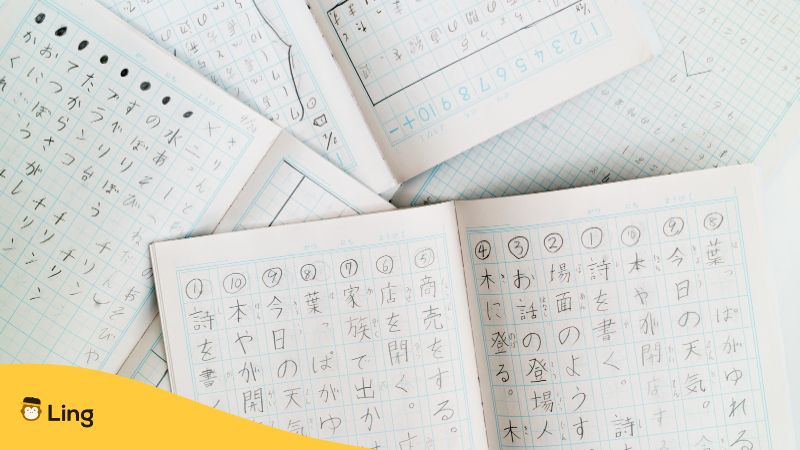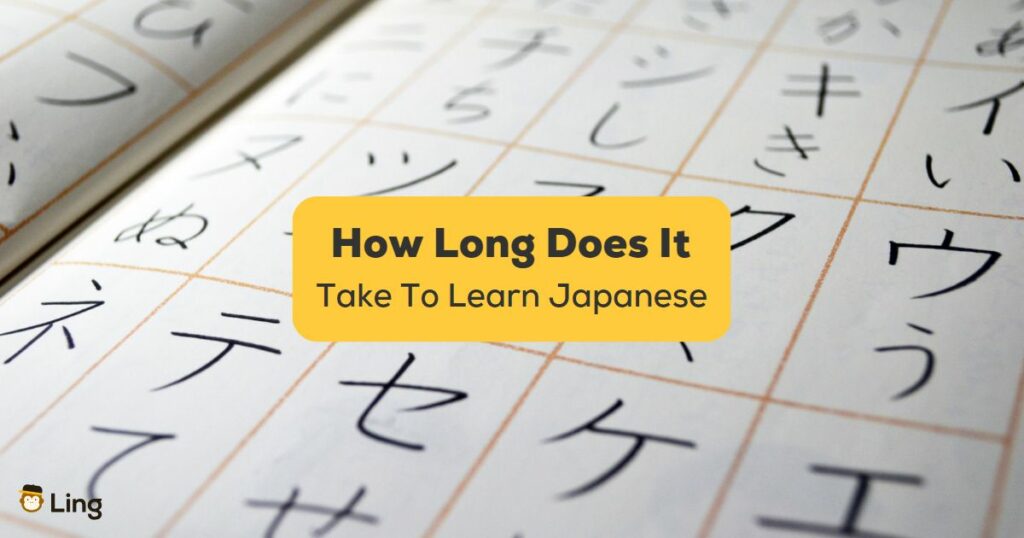Let me guess…you want to learn Japanese because you’re a fan of anime and manga. Maybe you want to travel to Japan or even live there. Or perhaps you just want to expand your career opportunities. Whatever your reason for learning Japanese, it’s worth it.
You might be discouraged because of the naysayers who believe Japanese is the hardest language to learn in the world. But remember that there are a lot of Japanese learners who have proved the opposite!
You may be wondering how long it takes to learn Japanese, but I’m afraid there’s not a simple response I can give to that question. That’s because it mostly depends on your individual learning process.
In this blog article, we’ll talk about the crucial factors that affect your language learning process, and in the end, we’ll take a look at what the Foreign Service Institute says about learning Japanese. So, let’s get started!
Page Contents 📑
- Is Japanese Hard To Learn?
- What Is Your Motivation To Learn Japanese?
- What Is Your Language Goal?
- What Is Your Study Method?
- What Is Your Native Language?
- How Many Hours Can You Commit To Learning Japanese?
- Are You Exposed To The Japanese Language?
- How Long Does It Take To Learn Japanese?
- Start Learning Japanese With Ling!
Is Japanese Hard To Learn?
Many people consider Japanese to be one of the hardest languages to learn. That’s because of the complex Japanese writing system, honorific language, and rich vocabulary brimming with kanji. Don’t let this discourage you from learning Japanese!
With the right study methods and tools, anyone can learn Japanese. Like any other language, it takes a lot of time and effort to become fluent. But the reward is worth it – not only will you be able to communicate with Japanese people, but you’ll also gain insight into unique Japanese culture and traditions.
In the rest of this article, we’ll touch upon some important factors that can speed up your Japanese learning process. Keep reading!
By the way, we have a whole other article about whether Japanese is hard to learn; you can find the answers that you’re looking for in that article!

What Is Your Motivation To Learn Japanese?
Your source of motivation is the number one element that affects your language learning. It is what makes you study in the first place. Your reason for learning Japanese is what motivates you. It may be traveling to Japan, living in Japan, studying the Japanese language at university, understanding anime and manga without translations, or communicating with a Japanese person with no language barrier.
If you’re trying to learn Japanese, you need intrinsic motivation. That is a motivation that comes from inside of you, not from somebody else, or not because it’s compulsory. Otherwise, the learning process would feel like torture for you rather than a fun journey. So, what’s your motivation for learning Japanese?
What Is Your Language Goal?
Your language learning goal has a direct influence on how much time you need to study Japanese to reach your desired level. Some people might want to achieve the utmost Japanese language proficiency level as they have a Japanese background. In contrast, some want to achieve conversational Japanese to get by in Japan. Based on your language goal, even the Japanese words you need to learn can differ.
Conversational Japanese
Conversational Japanese refers to the language used in daily conversations, such as greetings, asking for directions, ordering food, or making small talk with friends. If you want to learn conversational Japanese, don’t worry about the honorific language. Just skip it; you’ll be fine because you don’t need it in everyday life.
To speak Japanese conversationally, you can start by building a solid foundation of basic Japanese vocabulary and grammar, practicing pronunciation, and immersing yourself in Japanese culture through movies, music, and podcasts. You can also find language exchange partners or take online classes with a qualified tutor to improve your conversational Japanese skills.
Fluent Japanese
Being fluent in Japanese refers to being able to speak, read, write, and understand the Japanese language at a native level. It involves having a deep understanding of Japanese grammar, vocabulary, and cultural nuances, and being able to use them in various contexts, from casual conversations to business settings. Japanese fluency also includes being comfortable with different forms of the language, such as formal and casual speech, as well as different scripts like kanji, hiragana, and katakana.
Achieving fluency in Japanese requires a lot of time, dedication, and practice, and it’s important to have a structured learning plan, regular exposure to the language, and a willingness to make mistakes and learn from them.

What Is Your Study Method?
Your study method can significantly affect how long it takes you to learn Japanese. For example, if you have prior kanji knowledge, you may find it easier to read and write Japanese than someone who is starting from scratch.
Another important factor is choosing the right study materials. Online Japanese lessons can be a great resource for studying Japanese, as they often offer interactive exercises, pronunciation practice, and cultural insights. However, if you’re serious about learning Japanese, it’s important to make studying a regular habit. Consistency is key, so set aside dedicated time each day or week to study Japanese.
Lastly, try to make learning Japanese fun and engaging. Find Japanese movies, music, or books that you enjoy and use them to practice your language skills. By incorporating these factors into your study method, you can speed up your Japanese learning journey and become proficient in the language in no time.
Download Ling now from the Apple Play Store or Google Play Store and start speaking any language with confidence.
What Is Your Native Language?
Your native language can play a significant role in your Japanese learning process. For instance, native English speakers may have difficulty with the Japanese writing system since it is drastically different from the English alphabet. The Japanese language also has a completely different sentence structure than English. This can lead to confusion when trying to translate directly between the two languages.
However, some aspects of Japanese grammar, such as verb conjugation and particles, may be more straightforward for native English speakers. Ultimately, your native language can influence your approach to learning Japanese, so it’s essential to be aware of these differences and adjust your study method accordingly.
How Many Hours Can You Commit To Learning Japanese?
The number of hours you should commit to learning Japanese depends on your goals and your availability. If you’re learning Japanese for leisure or travel, then a few hours a week may be sufficient. However, if you’re planning to use Japanese for work or academic purposes, then it’s best to commit more time to study.
Basic kanji alone can take several months to learn, so it’s essential to set realistic goals and prioritize your study time accordingly. A good rule of thumb is to dedicate at least 2–3 hours per week to learning Japanese, but the more time you can commit, the faster you’ll progress. Remember, consistent effort is key to mastering any language.

Are You Exposed To The Japanese Language?
Exposing yourself to the target language is one of the best ways to improve your Japanese language skills. The more you surround yourself with the Japanese language and culture, the faster you’ll learn. There are a lot of ways to expose yourself to Japanese. For example, watching Japanese anime, movies, and TV shows can be a fun and engaging way to practice your listening skills and pick up new vocabulary. Similarly, listening to Japanese music can help you improve your pronunciation and rhythm.
You can also integrate Japanese into your daily life by reading Japanese news articles, cooking Japanese food, or chatting with a language exchange partner. Additionally, observing how Japanese kids learn their language can give you insights into the learning process and help you identify areas you need to focus on.
By immersing yourself in the Japanese language and culture, you’ll not only improve your language skills but also gain a deeper understanding of Japanese culture and customs.
How Long Does It Take To Learn Japanese?
So, “how long does it take to learn Japanese?” This is a common question among language learners, let’s see what the Foreign Service Institute says about learning Japanese. According to the FSI, it takes around 2,200 hours of study to reach a professional working proficiency level in Japanese. However, this time can change depending on your learning style, prior language experience, and study habits.
The Japanese Language Proficiency Test (JLPT) is a common measure of Japanese fluency and has five levels, from N5 (beginner) to N1 (advanced). It can take around 300–450 hours of study to pass the N5 level and up to 900-1,000 hours of study to pass the N1 level.
However, it’s important to remember that learning Japanese is a continuous process, and you can always develop your proficiency level with consistent effort and practice.
Start Learning Japanese With Ling!
Want to connect through the Japanese language? Ling can help you do that!
With its interactive games, mini quizzes, and chatbots, the Ling app makes language learning fun and simple! You can learn new things every time you open the app. Ling doesn’t only teach you a language, it also knows how to keep you engaged and motivated. Don’t wait any longer and join the millions of language learners who use Ling!
Plus, don’t forget to visit Ling’s Japanese blog to learn new things about the Japanese language and culture every week!
Until next time, じゃあまたね!


























